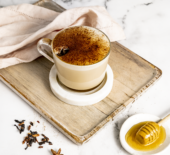Matcha can be seen everywhere on social media as the latest trending drink. Matcha is a finely ground green tea. This beverage dates much further back than the beginning of social media. Matcha originates from Japan where it was first enjoyed over a thousand years ago in the late 12th century.
These plants are shade-grown, stone ground, de-veined and de-stemmed to create a pure, full-flavoured matcha from Japan. No radiation is used in Tea Drop’s Matcha and the beverage is packed full of antioxidants. Antioxidants fight off free radicals which can cause damage and disease to the cells of your body when present in excess.
Matcha can be enjoyed as a substitute to coffee with 1 teaspoon of matcha giving you around 35mg of caffeine. Unless you have underlying medical conditions, are pregnant or breastfeeding, 400mg of caffeine is recommend as a healthy daily limit. If you want a 3–6-hour mental boost without the coffee crash, then matcha is the perfect beverage for you. An amino acid in matcha called L-theanine gives you a mental boost without the crash in energy levels.
The two main grades of matcha available are culinary and ceremonial. These two types of matcha are similar but there are distinctive differences. Ceremonial matcha is made by adding the matcha to a bowl and hot water then whisked with a whisk. In contrast culinary matcha is used in lattes and added as an ingredient in recipes.
Both the culinary and ceremonial matcha have a naturally sweet and mild taste. Culinary matcha is not so dark in colour compared to the ceremonial matcha which has a deeper and rich green. Ceremonial matcha contains slightly more of the amino acid L theanine.
Six health benefits of including a Tea Drop matcha as part of your day includes:
- The antioxidants called catechins in matcha can be up to 137 times greater than in your standard cup of green tea. A type of catechin called epigallocatechin-3-gallate (EGCG) may reduce your risk of certain cancers.
- L-theanine may help to optimise your immune system and promote a better night’s sleep. This amino acid may also promote healthy blood pressure levels.
- Matcha may assist in creating healthy cholesterol levels by reducing your ‘bad’ LDL cholesterol and triglycerides.
- May lead to rise in your body’s ability to use fat as a fuel source when exercising. One study showed an increase of 17% use of fat as a fuel source when green tea extract was taken.
- Reduce your risk of stroke and heart disease.
Take home message: You do not need to wait until your next run to the coffee shop to enjoy top quality matcha. This delicious beverage can now be enjoyed in Ceremonial and Culinary Matcha anytime as a drink or as part of a healthy recipe thanks to the quality Matcha range by Tea Drop.
10% discount code – FYFD10
https://www.teadrop.com.au/discount/FYFD10
References:
- Weiss DJ, Anderton CR. Determination of catechins in matcha green tea by micellar electrokinetic chromatography. J Chromatogr A. 2003 Sep 5;1011(1-2):173-80. doi: 10.1016/s0021-9673(03)01133-6. PMID: 14518774.
- Zheng XX, Xu YL, Li SH, Liu XX, Hui R, Huang XH. Green tea intake lowers fasting serum total and LDL cholesterol in adults: a meta-analysis of 14 randomized controlled trials. Am J Clin Nutr. 2011 Aug;94(2):601-10. doi: 10.3945/ajcn.110.010926. Epub 2011 Jun 29. PMID: 21715508.
- Arab L, Liu W, Elashoff D. Green and black tea consumption and risk of stroke: a meta-analysis. Stroke. 2009 May;40(5):1786-92. doi: 10.1161/STROKEAHA.108.538470. Epub 2009 Feb 19. PMID: 19228856.
- Venables MC, Hulston CJ, Cox HR, Jeukendrup AE. Green tea extract ingestion, fat oxidation, and glucose tolerance in healthy humans. Am J Clin Nutr. 2008 Mar;87(3):778-84. doi: 10.1093/ajcn/87.3.778. PMID: 18326618.
- You can also mention Matcha is a healthy beverage or use it to create healthy recipes etc.





